In the ongoing conversation about climate change, carbon dioxide often takes center stage, but there’s another, often overlooked character playing a significant role behind the scenes: methane. This potent greenhouse gas is a key player in the climate change narrative, and understanding its impact is crucial for tackling global warming.
What is Methane?
Methane is a colorless, odorless gas that is much less prevalent in the atmosphere than carbon dioxide but is significantly more effective at trapping heat. It’s produced through natural processes like wetland decomposition, but human activities such as agriculture, waste management, and fossil fuel extraction have dramatically increased its concentration in the atmosphere.
Methane’s Role in Climate Change
The reason methane is so significant in discussions about climate change is its potency. Over a 20-year period, methane is more than 25 times as effective as carbon dioxide at trapping heat in the Earth’s atmosphere. This makes it a major contributor to the greenhouse effect, which leads to global warming and climate change.
Sources of Methane Emissions
Key sources of human-induced methane emissions include:
- Agriculture: Livestock like cattle produce methane during digestion. This process, known as enteric fermentation, is a major source of methane emissions.
- Waste Management: Landfills are significant methane sources as organic waste decomposes anaerobically (without oxygen).
- Fossil Fuel Industry: Methane is released during the extraction, processing, and transportation of fossil fuels, especially natural gas and oil.
The Impact on Climate
Methane’s high warming potential means that even small concentrations can have a significant impact on the Earth’s climate. It contributes to the warming of the atmosphere, leading to extreme weather patterns, melting polar ice, rising sea levels, and other phenomena associated with climate change.
Tackling Methane Emissions
Reducing methane emissions presents a unique opportunity to slow climate change quickly. Strategies include:
- Improving Agricultural Practices: Adopting more efficient livestock farming methods and better manure management can reduce emissions from agriculture.
- Waste Reduction: Enhancing waste management practices, like capturing methane from landfills and using it for energy, can mitigate emissions from waste.
- Regulating Fossil Fuel Extraction: Implementing stricter controls on the release of methane during oil and gas extraction and processing can significantly cut emissions.
Methane may be less talked about than carbon dioxide, but its impact on climate change is profound. Tackling methane emissions offers a faster path to slowing global warming in the short term. By addressing methane, we can buy critical time in the broader fight against climate change, providing a clearer path towards a sustainable future for our planet.
Next On Your Reading List:


